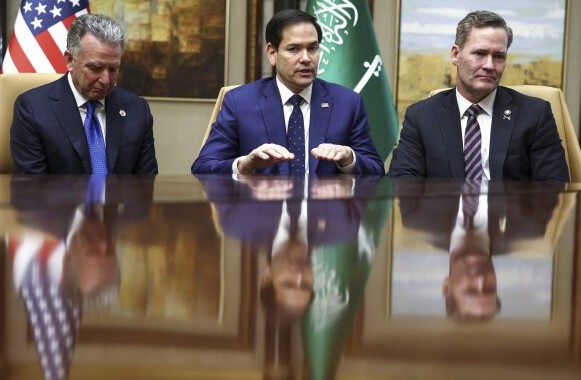A high-level Russian delegation, led by its foreign minister, met with a U.S. delegation for talks in Riyadh, Saudi Arabia. This was the most significant meeting between the two countries since Russia launched a full-scale invasion of Ukraine. The U.S. delegation was led by its secretary of state.
One of the key topics discussed was economic cooperation. Russia proposed that American oil companies be allowed to return to the country. Additionally, Moscow is looking for joint energy projects with the U.S. in the Arctic. The Russian official expressed optimism that American businesses would eventually return to Russia because of the economic opportunities available.
In a surprising turn of events, Russia has made a major offer to the United States regarding its natural resources and access to the Arctic. This was reported by The Moscow Times on February 18. The report cites a Russian official who attended recent discussions in Saudi Arabia.
The talks in Riyadh are significant because they mark a rare moment of diplomatic engagement between the two countries since the war in Ukraine began. The economic impact of the ongoing conflict has been severe, not only for Russia but also for Western nations that have imposed strict sanctions. By reopening discussions on economic cooperation, Russia appears to be testing the waters to see whether the U.S. would consider easing sanctions in exchange for access to its vast natural resources.
The Battle Over Natural Resources and Energy
While Russia is making overtures to the U.S., Ukraine has rejected a recent American proposal regarding its own natural resources. The Ukrainian president stated that while Ukraine is open to investment, the deal proposed by the U.S. needs further work. He pointed out that the memorandum presented by the U.S. does not include solid security guarantees for Ukraine.
A Russian official emphasized that before the war in Ukraine, American oil companies had successful operations in Russia. One of the biggest companies, Exxon Mobil, had a significant stake in an oil project in Sakhalin, a region in Russia. However, after the invasion, U.S. sanctions led Exxon Mobil and other major companies, such as Halliburton and Baker Hughes, to withdraw from Russia.
According to the Russian side, American businesses lost around $300 billion due to sanctions imposed on Russia. The official also claimed that the U.S. government gave misleading statements about Russia’s economy. Despite sanctions, Russia believes that American companies will eventually return to take advantage of the country’s vast natural resources.
Russia has also expressed interest in joint projects in the Arctic, suggesting that working together would benefit both nations. The Arctic is rich in natural resources and has significant strategic importance. However, international relations between Russia and Western nations remain tense, making cooperation difficult.
Energy analysts note that the Arctic region contains large untapped oil and gas reserves, which Russia has been developing for years. However, Western sanctions and the withdrawal of foreign investors have slowed down progress. By inviting American companies to partner in Arctic projects, Russia may be attempting to bypass economic restrictions while strengthening its energy sector.
Russia Wants Sanctions Lifted and Frozen Assets Returned
Russia is also pushing for the U.S. to unfreeze billions of dollars in Russian state assets. These assets, which belonged to Russia’s Central Bank and were invested in American financial institutions, were frozen as part of Western sanctions against Moscow. Russia estimates that its frozen assets in the U.S. are worth around $6 billion, while a much larger sum—about $200 billion—is held in Europe.
Meanwhile, the U.S. secretary of state assured European allies that American sanctions against Russia would remain in place until a resolution to the Russia-Ukraine war is reached. However, after discussions with the Russian delegation, the secretary acknowledged that lifting some sanctions could be part of any future peace negotiations. He stated that “concessions” would need to be made by all sides to bring an end to the conflict.
The meeting in Saudi Arabia marked an important moment in U.S.-Russia relations, but it remains unclear whether any major changes will come from these discussions. With both sides making demands and negotiations still ongoing, the world is watching closely to see what happens next.
At the same time, economic experts are debating whether the U.S. should even consider engaging with Russia on energy matters while the war in Ukraine continues. The Western stance has been to isolate Russia economically, and any sign of collaboration could be seen as a step back from that policy. However, some argue that economic engagement, particularly in Arctic energy projects, could lead to more diplomatic discussions, potentially opening doors to negotiations on other critical issues beyond energy.
Additionally, the Arctic remains a key point of contention, as both nations recognize its strategic and economic importance. The potential for cooperation—or conflict—over resources and military presence in the region could shape the broader landscape of U.S.-Russia relations in the years to come.


